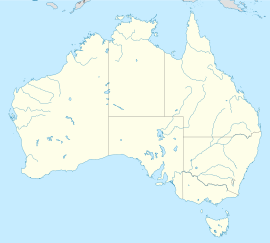Kalgoolie
|
Kalgoorlie Western Australia |
|||||||||
|---|---|---|---|---|---|---|---|---|---|

Kalgoorlie Court House, Hannan Street
|
|||||||||
| Coordinates | 30°44′56″S 121°27′57″E / 30.74889°S 121.46583°ECoordinates: 30°44′56″S 121°27′57″E / 30.74889°S 121.46583°E | ||||||||
| Population | 40,274 (2017) (44th) | ||||||||
| • Density | 536.3/km2 (1,388.9/sq mi) | ||||||||
| Established | 1893 | ||||||||
| Elevation | 468 m (1,535 ft) | ||||||||
| Area | 75.1 km2 (29.0 sq mi) (2011 urban) | ||||||||
| Time zone | AWST (UTC+8) | ||||||||
| Location | 595 km (370 mi) E of Perth | ||||||||
| LGA(s) | City of Kalgoorlie-Boulder | ||||||||
| State electorate(s) | Kalgoorlie, Eyre | ||||||||
| Federal Division(s) | O'Connor | ||||||||
|
|||||||||
Bold text
Kalgoorlie, part of the City of Kalgoorlie-Boulder, is a city in the Goldfields-Esperance region of Western Australia, Australia, located 595 kilometres (370 mi) east-northeast of Perth at the end of the Great Eastern Highway. The town was founded in 1893 during the Coolgardie gold rush, and is located close to the so-called "Golden Mile". It is also the ultimate destination of the Goldfields Water Supply Scheme and the Golden Pipeline Heritage Trail.
At June 2015, Kalgoorlie (including Boulder), had an estimated urban population of 32,797.
The name Kalgoorlie is derived from the Wangai word Karlkurla, meaning "place of the silky pears".
In the winter of 1893, prospectors Patrick (Paddy) Hannan, Tom Flanagan, and Dan Shea were travelling to Mount Youle when one of their horses cast a shoe. During the halt in their journey, the men noticed signs of gold in the area and decided to stay and investigate. On 17 June 1893, Hannan filed a Reward Claim, leading to hundreds of men swarming to the area in search of gold and Kalgoorlie, originally called Hannan's Find, was born.
The population of the town was 2,018 (1,516 males and 502 females) in 1898.
The mining of gold, along with other metals such as nickel, has been a major industry in Kalgoorlie ever since, and today employs about one-quarter of Kalgoorlie's workforce and generates a significant proportion of its income. The concentrated area of large gold mines surrounding the original Hannan's find is often referred to as the Golden Mile, and was sometimes referred to as the world's richest square mile of earth.
In 1901 the population of Kalgoorlie was 4,793 (3,087 males and 1,706 females) which increased to 6,790 (3,904 males and 2,886 females) by 1903.
The 3 ft 6 in (1,067 mm) narrow-gauge Government Eastern Goldfields Railway line reached Kalgoorlie station in 1896, and the main named railway service from Perth was the overnight sleeper train The Westland which ran until the 1970s. In 1917, a 4 ft 8 1⁄2 in (1,435 mm) standard gauge railway line was completed, connecting Kalgoorlie to Port Augusta, South Australia across 2,000 kilometres (1,243 mi) of desert, and consequently the rest of the eastern states. The standardisation of the railway connecting Perth (which changed route from the narrow-gauge route) in 1968 completed the Sydney–Perth railway, making rail travel from Perth to Sydney possible; the Indian Pacific rail service commenced soon after. During the 1890s, the Goldfields area boomed as a whole, with an area population exceeding 200,000, composed mainly of prospectors. The area gained a notorious reputation for being a "wild west" with bandits and prostitutes. This rapid increase in population and claims of neglect by the state government in Perth led to the proposition of the new state of Auralia but, with the sudden diaspora after the Gold Rush, these plans fell through.
...
Wikipedia

